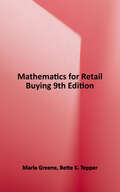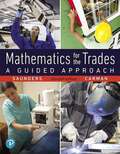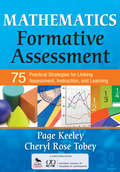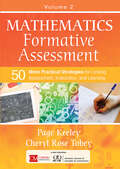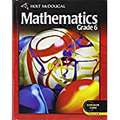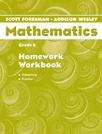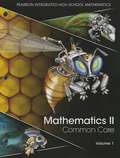- Table View
- List View
Mathematics For Retail Buying, 9th Edition
by Marla Greene Bette K. TepperMathematics for Retail Buying, Ninth Edition, introduces merchandising and retailing students to the most important concepts in retail math through step-by-step examples with practice problems and solutions. Coverage begins with the skeletal profit and loss statement and moves through retail pricing and repricing of merchandise, markups, markdowns, the retail method of inventory, six-month, and assortment planning. This new edition introduces a practical approach that incorporates actual retail scenarios and concepts that are relevant to the fashion industry today. There is also a focus on mathematical factors that affect the gross margin and profitability, key to the success of any merchandise buyer or planner. New to this Edition · Updated mathematical practice problems with selected answers in the back of the book for review · Updated case studies reflect realistic and practical merchandising situations · Thoroughly updated and revised text to reflect most common practices in the field of Mathematics for Retail Buying STUDIO -Study smarter with self-quizzes featuring scored results and personalized study tips -Review concepts with flashcards of terms and definitions and key formulas -Practice your skills by computing Practice Problems from the text, available digitally with formulas embedded in the Excel spreadsheets -Enhance your knowledge with additional real-world case studies and activities for each chapter
Mathematics For The Trades: A Guided Approach
by Hal Saunders Robert CarmanFor Basic Math, Math for the Trades, Occupational Math, and similar basic math skills courses servicing trade or technical programs at the undergraduate/graduate level. A solid foundation in the math needed for a wide range of technical and vocational trades Mathematics for the Trades: A Guided Approach is the leader in trades and occupational mathematics, equipping students with the math skills required for allied health, electrical trades, automotive trades, plumbing, construction, and many more – particularly in the physical trades. The math concepts are presented completely within the context of practical on-the-job applications, so students can make an impact on the job from day one. Authentic applications give students relevant, tangible mathematical examples that they are likely to encounter in future careers.
Mathematics Formative Assessment, Volume 1: 75 Practical Strategies for Linking Assessment, Instruction, and Learning
by Cheryl Rose Tobey Page D. KeeleyTransform your mathematics instruction with this rich collection of formative assessment techniques Award-winning author Page Keeley and mathematics expert Cheryl Rose Tobey apply the successful format of Keeley’s best-selling Science Formative Assessment to mathematics. They provide 75 formative assessment strategies and show teachers how to use them to inform instructional planning and better meet the needs of all students. Research shows that formative assessment has the power to significantly improve learning, and its many benefits include: Stimulation of metacognitive thinking Increased student engagement Insights into student thinking Development of a discourse community
Mathematics Formative Assessment, Volume 2: 50 More Practical Strategies for Linking Assessment, Instruction, and Learning (Corwin Mathematics Series)
by Cheryl Rose Tobey Page D. KeeleyEverything you need to promote mathematical thinking and learning! Good math teachers have a robust repertoire of strategies to move students’ learning forward. This new volume from award-winning author Page Keeley and mathematics expert Cheryl Rose Tobey helps you improve student outcomes with 50 all-new formative assessment classroom techniques (FACTS) that are embedded throughout a cycle of instruction. Descriptions of how the FACTs promote learning and inform teaching, including illustrative examples, support the inextricable link between instruction and learning. Useful across disciplines, Keeley and Tobey’s purposeful assessment techniques help K-12 math teachers: Promote conceptual understanding Link techniques to core ideas and practices Modify instruction for diverse learners Seamlessly embed formative assessment throughout the stages of instruction Focus on learning targets and feedback Instead of a one-size fits all approach, you can build a bridge between your students’ initial ideas and correct mathematical thinking with this one-of-a-kind resource!
Mathematics Formative Assessment, Volume 2: 50 More Practical Strategies for Linking Assessment, Instruction, and Learning (Corwin Mathematics Series)
by Cheryl Rose Tobey Page D. KeeleyEverything you need to promote mathematical thinking and learning! Good math teachers have a robust repertoire of strategies to move students’ learning forward. This new volume from award-winning author Page Keeley and mathematics expert Cheryl Rose Tobey helps you improve student outcomes with 50 all-new formative assessment classroom techniques (FACTS) that are embedded throughout a cycle of instruction. Descriptions of how the FACTs promote learning and inform teaching, including illustrative examples, support the inextricable link between instruction and learning. Useful across disciplines, Keeley and Tobey’s purposeful assessment techniques help K-12 math teachers: Promote conceptual understanding Link techniques to core ideas and practices Modify instruction for diverse learners Seamlessly embed formative assessment throughout the stages of instruction Focus on learning targets and feedback Instead of a one-size fits all approach, you can build a bridge between your students’ initial ideas and correct mathematical thinking with this one-of-a-kind resource!
Mathematics Formulas (Fourth Edition)
by Ron Larson Bruce Edwards Ignacio Bello Anton Kaul Jack BrittonThe value of r is between -1 (a perfect negative correlation) and +1 (a perfect positive correlation). When r is close or near 0, there is no linear correlation, Nota: The numerator for r is the same as that for m in equation (3), The denominator is also very similar to that for m.
Mathematics Homework Workbook (Grade #5)
by Scott ForesmanDaily homework pages for each child in the class.
Mathematics II, Common Core, Volume 1
by Randall I. Charles Allan E. Bellman Sadie Chavis Bragg Basia Hall Dan Kennedy Grant Wiggins William G. Handlin Art Johnson Laurie E. Bass Stuart J. MurphyNIMAC-sourced textbook
Mathematics II, Common Core, Volume 2
by Randall I. Charles Allan E. Bellman Sadie Chavis Bragg Basia Hall Dan Kennedy Grant Wiggins William G. Handlin Art Johnson Laurie E. Bass Stuart J. MurphyNIMAC-sourced textbook
